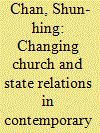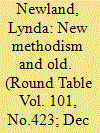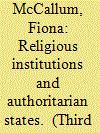| Srl | Item |
| 1 |
ID:
116489


|
|
|
|
|
| Publication |
2012.
|
| Summary/Abstract |
This study examines church-state relations in Mindong diocese, Fujian province, from the perspective of state-society relations. The article seeks to identify the salient patterns of church-state relations in Mindong diocese, and the social factors that contribute to the formation of such patterns. I elaborate on the essential characteristics of the Mindong model in the paper. I argue that the three key factors affecting church-state relations in Mindong diocese are the competition between the open and underground churches, the mediating role of the Vatican, and the pragmatism of local government officials. I describe the Mindong model as a "negotiated resistance," meaning that the underground church resists the control of the government and seeks organizational autonomy through continued negotiation with officials of the government. In conclusion, I discuss the implications of this church-state model in advancing religious freedom in Chinese society.
|
|
|
|
|
|
|
|
|
|
|
|
|
|
|
|
| 2 |
ID:
114193


|
|
|
|
|
| Publication |
2012.
|
| Summary/Abstract |
Divorce legislation was enacted in Malta in 2011 following a consultative referendum. Until then the biggest barrier to divorce had been the perceived influence of the Catholic Church, expressed not just in its presence in many spheres of public life, but in historical reminders of the political costs of challenging its status and doctrines. The process leading to the introduction of divorce showed: that the political parties still feared confronting the Church; that the Church itself had been losing ground as a politically coercive or persuasive force; and that the biggest challenge to its status and relevance was coming from below, as a result of people's changing attitudes and lifestyle. This contrasts starkly with the history of Church-State relations and its landmark political-religious conflicts, involving the ecclesiastical establishment on the one hand, and secularising political forces on the other. Retracing the history of political-religious strife, this paper seeks to evaluate the changing quantity and quality of ecclesiastical power in Malta, up to the point when the divorce question exposed its limits, though not its end.
|
|
|
|
|
|
|
|
|
|
|
|
|
|
|
|
| 3 |
ID:
116304


|
|
|
|
|
| Publication |
2012.
|
| Summary/Abstract |
Although Methodism has remained the dominant form of Christianity in Fiji, Methodist beliefs have been contested by a proliferation of Pentecostal/evangelical churches, but never more directly than by a new form of Methodism which flourished in the years up to 2009. This new church was called the New Methodist Church and, for a period in 2008 and 2009, the Fiji police forces were strongly encouraged to participate and finally to convert to it. This article is part of ongoing research that traces the alliances and challenges between Christianity and the state in Fiji.
|
|
|
|
|
|
|
|
|
|
|
|
|
|
|
|
| 4 |
ID:
110109


|
|
|
|
|
| Publication |
2012.
|
| Summary/Abstract |
The churches in the Middle East are generally perceived to be supportive of the authoritarian states in the region. The motivations for this strategy and its successes and limitations in the context of the authoritarian environment and the religious heritage of the region are explored. The article argues that the approaches pursued are determined by the structure of the community in relation to the majority and other Christian communities as well as by state policies towards the community. The overriding aim of church leaders of protecting their communities has led to a modern variation of the historical millet system, which provides them public status in exchange for their acquiescence in regime policies. This security guarantee, combined with wariness towards other potential political actors and the desire to protect their privileged position from communal challengers, has resulted in the hierarchies' preference for the authoritarian status quo rather than encouraging democracy promotion.
|
|
|
|
|
|
|
|
|
|
|
|
|
|
|
|